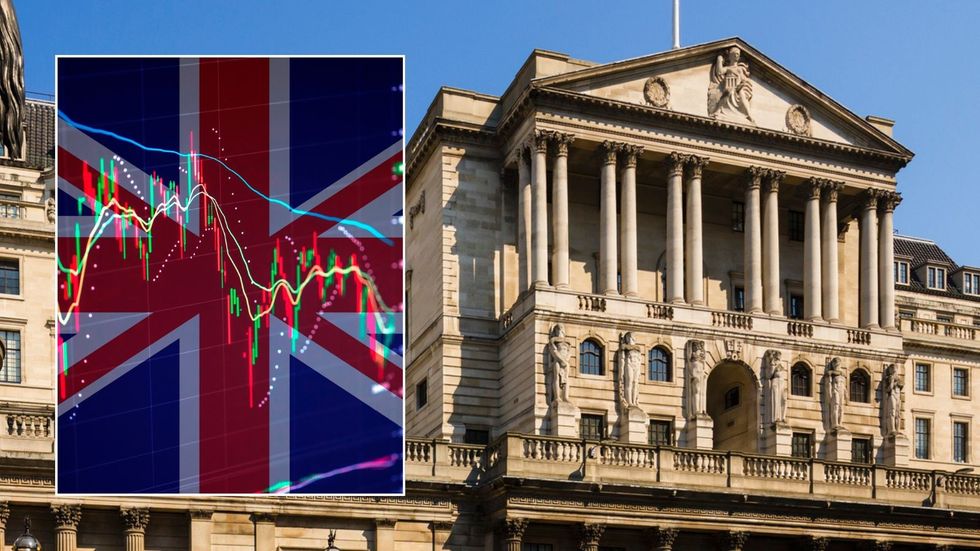Chancellor Rachel Reeves begins to outline her plans to grow the economy
GB NEWS
Analysts are pricing in an interest rate cut from the Bank of England next week
Don't Miss
Most Read
Trending on GB News
The Bank of England is expected to bring down borrowing costs and cut interest rates to their lowest level in 18 months this Thursday, as policymakers weigh up mounting economic pressures.
Economists widely predict that it is a "sure bet" the Bank's Monetary Policy Committee (MPC) will reduce the base rate from 4.75 per cent to 4.5 per cent at their February 6 meeting.
The anticipated quarter-point cut would continue the series of reductions that began last summer, with the central bank previously hiking the base rate to as high as 5.25 per cent in its fight against inflation.
With the consumer price index (CPI) easing closer to the Bank's desired target of two per cent, MPC members have slowly slashed borrowing costs in a win for mortgage holders and those in debt.
Thomas Pugh, an economist at consulting firm RSM, called the upcoming cut a "sure bet", though he warned policymakers face a "dreaded trade-off" between supporting growth and managing inflation risks.
Do you have a money story you’d like to share? Get in touch by emailing money@gbnews.uk.

Analysts are pricing in an interest rate cut from the Bank of England next week
GETTY
The base rate influences the cost of mortgages, loans and savings account interest rates across the economy. The Bank typically raises rates when inflation is high to discourage spending and slow price rises.
As it stands, inflation is now sitting at 2.5 per cent, significantly below recent peaks. These elevated rates have left mortgage costs much higher than was typical over the past decade.
Notably, the UK economy's stagnating growth has fuelled expectations of a rate cut to stimulate spending. However, economists warn of mounting inflation pressures that complicate the decision.
"The economy has clearly underperformed since the last set of forecasts by the Bank back in November," Pugh added. However, he noted that inflationary pressure is "now rising again", creating a challenging balancing act for policymakers.

Mortgage holders have been saddled with hiked repayments as a result of the Bank of England's decision-making
GETTYWhen sluggish economic growth combines with rising inflation, economists term it "stagflation". The Bank's nine-member Monetary Policy Committee will weigh these competing factors in Thursday's decision.
Inflation is forecast to rise towards three per cent during the spring months, driven by multiple factors. Rising energy costs are partly behind the expected increase, alongside the impact of policy changes.
The Chancellor's Autumn Budget decision to raise National Insurance contributions and the National Living Wage for companies is expected to push up costs over the next year.
However, Rachel Reeves has pledged to "kickstart the economy" and focus on improving gross domestic product (GDP) growth in her next fiscal statement, which takes place on March 26.
Monica George Michail, an associate economist at the National Institute of Economic and Social Research (NIESR), warned of continued uncertainty in the months to come.
She explained: "Annual CPI inflation slightly fell to 2.5 per cent in December 2024 but is forecasted to record a rise in January due to base effects from last year before slowing again."
LATEST DEVELOPMENTS:

The Bank of England's MPC will meet next week to discuss interest rates
GETTYCore inflation dropped to 3.2 per cent in December from 3.5 per cent in November, which the financial analysts claims would suggest easing underlying pressures on the economy.
Matt Swannell, a chief economic advisor to the EY Item Club, said a quarter point cut is "highly likely" at the February meeting but highlighted an ongoing challenge for the Bank.
He said: "That does not take away from the longer term dilemma facing the Bank of England, as its latest set of projections are likely to show that upcoming growth will be weaker, but near-term inflation will be higher than when it met three months ago."
The NIESR suggests the the central bank will remain cautious in its approach to rate cuts throughout 2025. Rates may "remain higher for longer" amid heightened global uncertainty and inflation expectations.








